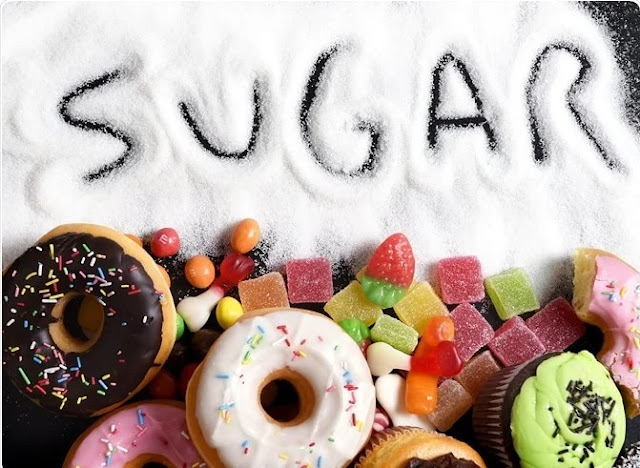Sugar and Weight Gain
Sugars are carbohydrates, which are one the most most valuable sources of energy for the body. Sugar is necessary for proper brain function and physical activity where it can be used as fuel. However, if sugar is not used immediately it is stored as glycogen in the liver and muscles. Because storage space is limited, any glycogen which is not used turns to fat.
So, Which Foods Contain Sugar?
Many foods contain naturally occurring sugars and carbohydrates, including fruits and vegetables, grains, legumes and dairy. These foods contain plenty of vitamins, minerals, antioxidants and amino acids. However, when these natural foods are processed and mixed with other ingredients, their natural nutrient density is lost. More often than not, manufacturers make up for this loss by adding natural and artificial fillers to make the food taste better. Biscuits can be made crispier, breads can be made softer and yoghurts can be made smoother. Added carbohydrates can balance salty and sour tastes and change the consistency of sauces, gravies, spreads and dips. Added sugars can make food more appealing to the palate and more aesthetically appealing.
Deceptive Labels
The ingredients list on many foods will not use the word "sugar", however this does not mean that there is no sugar present. Sugar is often listed under other names. Below are some of the most common.
- Brown sugar
- Beet sugar
- Cane sugar
- Confectioner's sugar
Many people believe honey, molasses, brown and raw sugars to be more healthy than processed white sugar. Although there are slightly more minerals in these than over-processed table sugar, they do have similar properties and provide the same amount of energy per gram.
On top of this, just because a label may have "No Added Sugar" on it, does not necessarily mean that the food does not contain any sugar – the food in its most raw form may be naturally loaded with sugars and other carbohydrates.
Sugar and Weight Gain
Many people are under the impression that sugar causes weight gain, however this is not the case. Weight gain results when more calories are consumed than burned – regardless of where the calories came from – protein, fat or carbohyrates. It is simply easier to gain weight with sugars because they lack nutrients and are dense in calories. It is difficult to feel satiated when consuming sugars and therefore it becomes easy to eat too much. Sugar is also an appetite stimulant, and when blood sugar levels are raised appetite can increase once these levels inevitably plummet.
Hidden Sugars
Some foods that are advertised as low fat, such as ice-creams and yoghurts often contain higher sugar levels. This is because most manufacturers replace the fat that has been removed with additional sugar in order to make these foods more palatable. On top of this, foods that are low in fat are less satisfying as they are broken down and absorbed quickly, making the consumer feel hungry soon after the food has been consumed. Natural yoghurts with no added sugars and flavours, mixed with fresh berries and real fruit is the best way to enjoy the benefits of dairy.
Foods to Watch Out For
Many foods which may be perceived to be healthy or have a "low carb, sugar free" label on them may actually contain many hidden sugars. You should always read the labels and keep in mind that the more processed the food, the more sugar it is likely to contain.
Cereals – Many "healthy" cereals are coated with plenty of sugar, particularly if they are sold as low fat or fat free. When fat is missing from a cereal it tastes bland, therefore additional sugar is added to create crunchiness. It is better to stick to wholegrains and make them tastier by adding cinnamon, ginger or a few drops of vanilla, as well as fresh fruit such as chopped banana or apple.
Low-carb and sugar-free foods – Foods that are listed as low-carb or sugar-free are usually sweetened with sugar alcohols. Sugar alcohols are partially digested, which means that they do not raise blood sugar levels to the same extent as regular sugar. However, they still provide calories and have been known to increase appetite.
Deli meats - Many deli meats are high in fat, salt and sugar. Devon, spam and processed meat rolls in particular are low in protein, vitamins and minerals. The less processed the meat, the less sugar it contains. It is advisable to study the nutrition panel before making a decision. Naturally low fat meat and fish contain no carbs or sugar and also provide the highest quality protein. Adding herbs and spices will help to achieve the best texture and flavour possible.
Sauces, gravies, spreads and dips – Sugars are added to these in order to balance the acidity of the tomatoes, sweeten starches and even increase appetite. Even the saltiest spreads and dips contain some form of sugar to enhance the flavour. Home-made sauces are the best way to go. Try creating something of your own with fresh vegetables, herbs and spices. The end result will be low in sugar, naturally delicious and guilt-free.
All in all, although sugar is necessary for our health, the best kinds are naturally occurring and are found in many fruits and vegetables. As a general rule, the more processed the food, the higher the sugar content.
